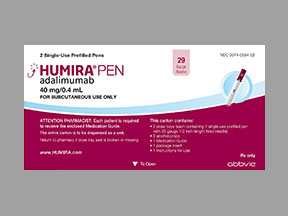
Humira (2 Pen) Coupons & Savings Card – Discount Prices from $6159.00
My prescription
Edit
40MG/0.4ML, Humira (2 Pen) (2 Auto-injector Kits)
Select pharmacy

Walgreens
$6159.00
COUPON PRICE
Albertsons
$6746.88
COUPON PRICE
Walmart
$7193.18
COUPON PRICEHumira (2 Pen) savings card
Show this card to your pharmacist
Walgreens
$6159.00
BIN
ID
PCN
GRP
019876
LH2CBE3346
CHIPPO
LHX
Powered by
Price history for Humira (2 Pen)
2 Auto-injector Kits, 40MG/0.4ML
Average retail price for Humira (2 Pen)
Average SaveHealth price for Humira (2 Pen)
Our price history data is based on aggregated prescription data collected from participating pharmacies in America. Our prescription data updates daily to reflect the latest price changes. If you notice a missing data point, it means there wasn't sufficient data available to generate a monetary value for that date.
*Retail prices are based on pharmacy claims data, and may not be accurate when we don't have enough claims.
Humira (2 Pen) dosage forms
Dosage Quantity Price from Per unit 40MG/0.4ML 2 Auto-injector Kits $6159.00 $3079.50 40MG/0.4ML 1 Auto-injector Kit $3079.37 $3079.37 40MG/0.4ML 3 Auto-injector Kits $9238.62 $3079.54 40MG/0.8ML 1 Auto-injector Kit $3090.21 $3090.21 40MG/0.8ML 2 Auto-injector Kits $6180.68 $3090.34 40MG/0.8ML 3 Auto-injector Kits $9271.14 $3090.38 80MG/0.8ML 1 Auto-injector Kit $6157.02 $6157.02 80MG/0.8ML 2 Auto-injector Kits $12314.28 $6157.14 80MG/0.8ML 3 Auto-injector Kits $18471.55 $6157.18
| Dosage | Quantity | Price from | Per unit |
|---|---|---|---|
| 40MG/0.4ML | 2 Auto-injector Kits | $6159.00 | $3079.50 |
| 40MG/0.4ML | 1 Auto-injector Kit | $3079.37 | $3079.37 |
| 40MG/0.4ML | 3 Auto-injector Kits | $9238.62 | $3079.54 |
| 40MG/0.8ML | 1 Auto-injector Kit | $3090.21 | $3090.21 |
| 40MG/0.8ML | 2 Auto-injector Kits | $6180.68 | $3090.34 |
| 40MG/0.8ML | 3 Auto-injector Kits | $9271.14 | $3090.38 |
| 80MG/0.8ML | 1 Auto-injector Kit | $6157.02 | $6157.02 |
| 80MG/0.8ML | 2 Auto-injector Kits | $12314.28 | $6157.14 |
| 80MG/0.8ML | 3 Auto-injector Kits | $18471.55 | $6157.18 |
What happens if you take too much Humira?
Taking too much Humira (adalimumab) can increase the risk of experiencing side effects. Common side effects may include infections, injection site reactions, and allergic reactions. In case of an overdose, it is important to seek medical attention immediately. A healthcare professional can provide guidance on the appropriate steps to take and monitor for any adverse effects.
How to make Humira injections less painful?
To make Humira injections less painful, one can try the following strategies:1. Room Temperature: Allow the Humira pen or syringe to reach room temperature by taking it out of the refrigerator about 15 to 30 minutes before the injection. This can help reduce discomfort.2. Ice Pack: Apply an ice pack to the injection site for a few minutes before administering the injection to numb the area and reduce pain.3. Injection Site Rotation: Rotate the injection sites to avoid using the same spot repeatedly, which can help minimize irritation and pain.4. Relaxation: Try to relax the muscles in the area where the injection will be given. Tension can increase discomfort.5. Topical Anesthetic: Consider using a topical anesthetic cream or spray to numb the skin before the injection, if recommended by a healthcare provider.6. Proper Technique: Ensure proper injection technique as instructed by a healthcare professional to minimize pain and discomfort.7. Distraction: Use distraction techniques, such as listening to music or watching a video, during the injection to help take the focus off the pain.If pain persists or there are concerns about the injection process, consulting with a healthcare provider is advisable.
Is Humira better in the thigh or stomach?
The choice between injecting Humira in the thigh or stomach depends on personal preference and comfort. Both sites are effective, but some individuals may find one area less painful or easier to access than the other. It is important to rotate injection sites to reduce the risk of irritation or discomfort. Consulting with a healthcare provider can help determine the best option for the individual.
Do you have to pinch skin for Humira injection?
Yes, it is generally recommended to pinch the skin when administering a Humira injection. This helps to create a firm surface for the needle to penetrate and can make the injection more comfortable. The injection is typically given in the thigh or abdomen, avoiding the navel area.
